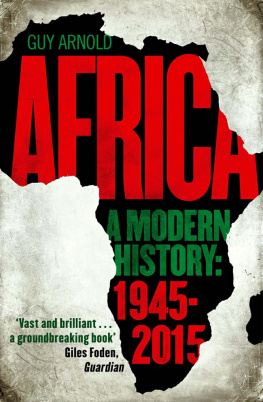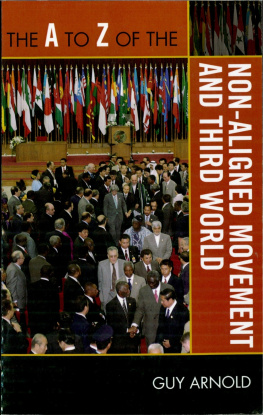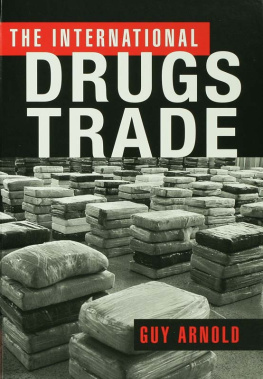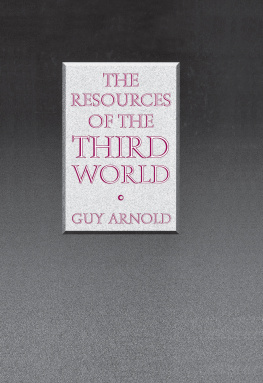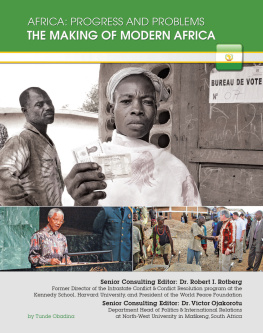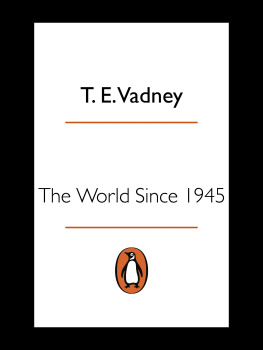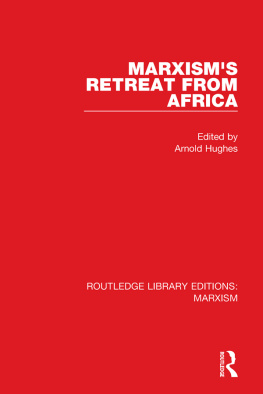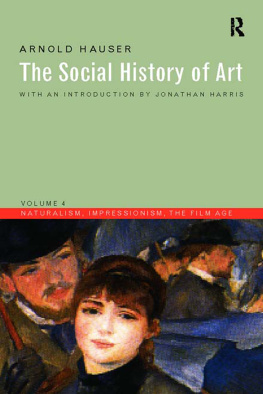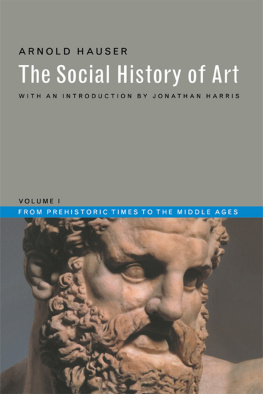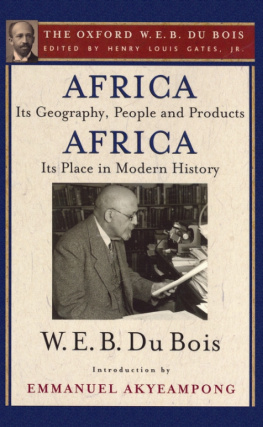Guy Arnold - Africa: a modern history: 1945-2015
Here you can read online Guy Arnold - Africa: a modern history: 1945-2015 full text of the book (entire story) in english for free. Download pdf and epub, get meaning, cover and reviews about this ebook. City: London, year: 2017, publisher: Atlantic Books, genre: Politics. Description of the work, (preface) as well as reviews are available. Best literature library LitArk.com created for fans of good reading and offers a wide selection of genres:
Romance novel
Science fiction
Adventure
Detective
Science
History
Home and family
Prose
Art
Politics
Computer
Non-fiction
Religion
Business
Children
Humor
Choose a favorite category and find really read worthwhile books. Enjoy immersion in the world of imagination, feel the emotions of the characters or learn something new for yourself, make an fascinating discovery.
- Book:Africa: a modern history: 1945-2015
- Author:
- Publisher:Atlantic Books
- Genre:
- Year:2017
- City:London
- Rating:4 / 5
- Favourites:Add to favourites
- Your mark:
- 80
- 1
- 2
- 3
- 4
- 5
Africa: a modern history: 1945-2015: summary, description and annotation
We offer to read an annotation, description, summary or preface (depends on what the author of the book "Africa: a modern history: 1945-2015" wrote himself). If you haven't found the necessary information about the book — write in the comments, we will try to find it.
Africa: a modern history: 1945-2015 — read online for free the complete book (whole text) full work
Below is the text of the book, divided by pages. System saving the place of the last page read, allows you to conveniently read the book "Africa: a modern history: 1945-2015" online for free, without having to search again every time where you left off. Put a bookmark, and you can go to the page where you finished reading at any time.
Font size:
Interval:
Bookmark:


CONTENTS
ACKNOWLEDGEMENTS
From 1960 to 2000, the period covered by this book, momentous changes occurred throughout Africa to transform the continent from being a colonial extension of Europe into fifty independent nations. Following independence these new nations, struggled to achieve an identity of their own, faced the pressures of the Cold War, witnessed the emergence of the one party state and the charismatic political leader, watched the rise of their armies as major political players who carried out coups on a scale unequalled anywhere else and saw their continent wracked by wars that inevitably attracted interventions by the worlds leading powers in the Congo, Angola, the Horn and elsewhere. Lack of trained personnel and economic weakness rendered most African countries deeply vulnerable to external manipulation by the former colonial powers, the new superpowers, part of whose ideological confrontations were conducted in Africa, and the western controlled World Bank and IMF, a process famously described by Kwame Nkrumah as neo-colonialism. The Africa which established the Organization of African Unity in 1963 had changed out of recognition by the beginning of the 21st century. By any reckoning the events of these years amount to an historical revolution.
During 40 years of travelling in Africa and writing about its political and economic development I have drawn upon the knowledge and experience of a wide range of people whom it would be impossible to name. Their insights have influenced my own growing understanding and attachment to Africa over my professional writing life and this book reflects that influence though the arguments and conclusions are entirely my own.
I wish to record my particular thanks to Toby Mundy, my publisher, who has backed this large project with enthusiasm; and Louisa Joyner who has overseen each stage in the preparation of the book for publication. I am particularly grateful to Sue Hewitt and Ruth Weiss for their careful reading of the text and suggestions as to facts, presentation and clarity, and to Derek Ingram for a final appraisal.
Guy Arnold
2005
LIST OF ILLUSTRATIONS
SECTION 1:
SECTION 2:
SECTION 3:
SECTION 4:
SECTION 5:
LIST OF MAPS
Part I: The 1960s Decade of Hope
Part II: The 1970s Decade of Realism
Part III: The 1980s Basket Case?
PART IV: The 1990s New Directions and New Perceptions
*
DATE LINE
1940s
1945 End World War II
Establishment of United Nations
Sixth Pan-African Conference (Manchester, England)
Setif Uprising, Algeria
Only four African countries independent Egypt, Ethiopia Liberia, South Africa
1948 National Party wins South African election; implements apartheid
1950s
1951 Portugal transforms its African colonies into overseas provinces
Egypt abrogates 1936 Treaty with Britain; British troops occupy Canal Zone
Libya independent
1952 Army coup in Egypt; King Farouk goes into exile
Ahmed Ben Bella forms Algerian Revolutionary Committee in Cairo
1952-1959 Mau Mau rebellion in Kenya
1953 Trial of Jomo Kenyatta for managing Mau Mau backfires, helps create myth of Kenyatta the nationalist leader
Britain forms Central African Federation (CAF): Northern Rhodesia, Southern Rhodesia, Nyasaland under white minority rule
1954 Col. Nasser takes full control in Egypt
National Liberation Front (FLN) launches Algerian war of independence
1956 Sudan, Morocco, Tunisia independent
Suez Crisis
French Loi Cadre gives universal suffrage in French West and Equatorial Africa
1957 Gold Coast independent as Ghana
1958 De Gaulle tours Francophone Africa; offers self-government within a French Community
Guinea under Sekou Tour opts for full independence; France breaks relations
1960s
1960 Harold Macmillan gives Wind of Change speech in Cape Town
21 March, Sharpeville Massacre in South Africa
30 June, Belgian Congo independent; descends into chaos
annus mirabilis most of Francophone Africa Cameroon, Central African Republic, Chad, Congo (B), Dahomey (Benin), Gabon, Ivory Coast (Cte dIvoire), Madagascar, Mali, Mauritania, Niger, Senegal, Togo, Upper Volta (Burkina Faso) independent
Ethiopia, abortive coup against Emperor Haile Selassie
British Somaliland joins former Italian Somaliland to form independent Republic of Somalia
Nigeria independent
1961 Patrice Lumumba murdered in Katanga (Congo)
Casablanca (radical) and Monrovia (moderate) groups threaten to divide Africa into rival camps
Portugal claims its African subjects are full citizens of Portugal
Liberation struggle launched in Angola
Sierra Leone, Tanganyika independent
South Africa leaves Commonwealth
Death of UN Secretary-General Dag Hammarskjold
ECA study: Impact of Western European integration on African trade and development EEC a threat to African exports
1962 Algeria, Uganda independent
Haile Selassie ends Federation of Eritrea and Ethiopia, incorporates Eritrea in Empire prelude to 30 years warfare
UN general assembly calls upon all members to break ties with South Africa; special committee against apartheid is established
1963 Katanga secession ended by UN forces
Addis Ababa conference of 30 independent African states creates Organisation of African Unity (OAU)
Early OAU resolution calls on all members not to establish any relations with South Africa until apartheid is abandoned
Amilcar Cabral launches independence struggle in Portuguese Guinea (Guinea-Bisau)
First Yaounde Convention between the EC and African countries with ties to EC (former colonies of members)
Kenya, Zanzibar independent Central African Federation dissolved
1964 revolution in Zanzibar (January); Zanzibar joins Tanganyika to form
United Republic of Tanzania (April)
British forces quell army mutinies in East Africa
First OAU summit held in Cairo
FRELIMO launches liberation struggle in Mozambique
French troops reverse coup in Gabon to keep MBa in power
The Shifta border war between Kenya and Somalia to 1967
Rivonia treason trial in South Africa: Mandela, Sisulu and other African nationalist leaders get life sentences, sent to Robben Island
Nyasaland and Northern Rhodesia independent as Malawi and Zambia
Zhou en Lai in Mali enunciates Eight Principles of Chinese aid
1965 Coup in Algeria: Ben Bella deposed; Boumedienne becomes head of state
The Gambia independent
White minority government of Southern Rhodesia makes unilateral declaration of independence (UDI) 11 November
OAU resolution calls on members to break diplomatic relations with Britain by 15 December unless it has taken action to reverse UDI; only 11 countries do so
Joseph Mobutu carries out second coup in the Congo (24 November) to rule to 1997
1966 Commonwealth summit in Lagos devoted to UDI in Rhodesia
Coup in Nigeria: military rule replaces civilian government
UN imposes sanctions on Rhodesia
Coup ousts Nkrumah in Ghana; military rule
UN General Assembly proclaims 21 March (Sharpeville day) International day for the Elimination of Racial Discrimination
UN terminates South Africas mandate over South West Africa (Namibia)
SWAPO launches armed struggle in Namibia
Assassination of Prime Minister Verwoerd of South Africa
Font size:
Interval:
Bookmark:
Similar books «Africa: a modern history: 1945-2015»
Look at similar books to Africa: a modern history: 1945-2015. We have selected literature similar in name and meaning in the hope of providing readers with more options to find new, interesting, not yet read works.
Discussion, reviews of the book Africa: a modern history: 1945-2015 and just readers' own opinions. Leave your comments, write what you think about the work, its meaning or the main characters. Specify what exactly you liked and what you didn't like, and why you think so.

